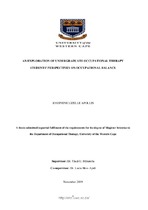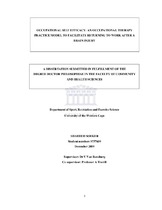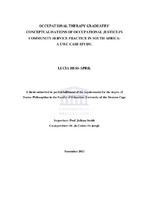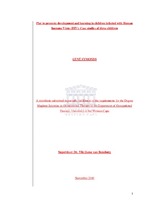| dc.description.abstract | Occupational justice empowers individuals, especially the previously disadvantaged, to have their
basic needs met, as well as turn their potential into reality, through human rights and labour
legislation, which provides access to equal opportunities. However, with the amount of different
choices, in terms of occupational roles, facing the individual to fill their time with, effective
management thereof to preserve one’s health and well-being on a daily basis, is not necessarily
guaranteed. Occupational science, and more specifically, occupational therapy education imparts
the importance of occupational balance, a concept which denotes a balance between the person,
their environment and their occupations, some of which are strenuous and others relaxing.
Occupational balance can be achieved by adapting the physical, mental, social and rests
occupations. | en_US |




